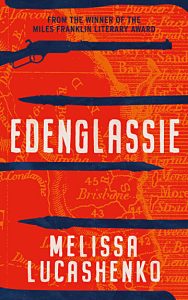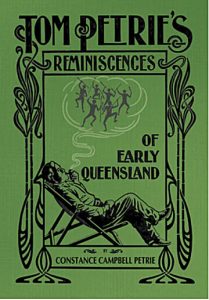 I am currently reading Edenglassie, a novel by Melissa Lucashenko, because it was introduced to me at the Brisbane Writers’ Festival a few months ago and because I am always delving into historical records relating to the aboriginal people, especially those around where I live.
I am currently reading Edenglassie, a novel by Melissa Lucashenko, because it was introduced to me at the Brisbane Writers’ Festival a few months ago and because I am always delving into historical records relating to the aboriginal people, especially those around where I live.
I recall that many years back, probably like most other white people here, occasionally noticing a few black people in a city park, assuming they were drunk and sensing them to be almost like an alien threat to decency. Here is an excerpt from Edenglassie — an old aboriginal woman, Eddie, is in hospital telling a naive white person, Dartmouth, what it used to be like back when whites first settled here:
“And there was always blackfellas camped near the Valley [a part of the city ofBrisbane], right up till the war, they was never shifted off. A lot of that crowd ended up in Spring Hill and Paddington later on, stone’s throw from the city. The Beehives, the Johnsons and the Wallabys. You ask Aunty Deb Beehive, her old father and uncles used to all corroboree at Spring Hill in the seventies. We’d hear em often when we was over that side of the river, clapsticks and all. And card games at Victoria Park, oh my! Biggest card games all us Murries had. No, we was a part of Brisbane alright, we was always in the thick of things.’
‘And this, ah, crowd – the fringe dwellers at Spring Hill. Where were they from?’ Dartmouth asked, . . . .
Granny Eddie peered at him. Not just an idiot, but blurry too.
‘From?’‘Yes, originally. Before they were in the Valley.’
‘They weren’t from anywhere. They was always there.”
“Dartmouth adjusted his glasses, flushing. ‘Ah, yes. Of course. Of course, they were.’
‘They call us mob fringe dwellers,’ Eddie added, ‘but Goories ain’t no fringe, you whitefellas is the fringe! We always lived on our own Countries and then the dagai come and plonked themselves down next to us. Or on top of us, if they felt like it! Beehive and Wallaby mob always been in the Valley, long before John Oxley came up the damn river! Fringe dwellers my dot! That word makes me proper wild!’
Dartmouth changed tack.
‘Okay, roger that, no fringe dwellers. Do you know much about the convict era, Eddie? Or the Petrie family?’ he probed delicately. ‘They say Tom Petrie* grew up with the local tribe?’
‘Oh, he did, he did!’ Eddie sat up, enthused. ‘Well, he had to. He was . . . the only white jarjum here for years and years. He learnt the lingo from a baby, a few different lingos in fact. And he was the only one to ask. Ever.’ Granny’s forefinger was raised in admonition of all other colonists.
‘Ask?’ . . . .
“Yep. He was raised with the Yagara mob, so when he grew up and got married, he knew to ask where to select his land, he got permission off of Old Man Dalapai, see. Tom was a man of culture. They say he went through the Bora ceremonies and all … my grandad knew him. And Tom’s father, old Grandfather Andrew Petrie, he saved the Bunya Pines from the logging, Grandad Charlie reckoned. Cos he knew how much them trees mean to the blackfellas.’
‘So, it’s true the Petries were friendly with the Brisbane tribe?’ Dartmouth prompted, mentally deleting his stockwhips in favour of Granny’s narrative. ‘And Tom was actually initiated?’
‘Oh, yes,’ answered Granny. ‘Initiation means ya part of the tribe, well and truly,’ she said, answering the second part of Dartmouth’s question. Suddenly growing tired, she felt the nagging ache in her neck starting up again. ‘The Petries were decent people, educated people. If everyone had been like them things could have been different alright. If the whitefellas had just asked.”
Lucashenko, Melissa. Edenglassie. St Lucia, Qld.: University of Queensland Press, 2023. http://www.librarything.com/work/31046772/book/265015661. (pp 80-82)
* Tom Petrie was a historical person. For a fascinating education in aboriginal life “as it really was” an absolute “must read” is Tom Petrie’s reminiscences of early Queensland. Tom Petrie as a boy mixed with the local aboriginals, learning more than one of their languages (as a rule they were multilingual), and was highly respected by them all. And when older he really did ask them for land to settle before completing legal paperwork with the white authorities.
Tom Petrie as a boy mixed with the local aboriginals, learning more than one of their languages (as a rule they were multilingual), and was highly respected by them all. And when older he really did ask them for land to settle before completing legal paperwork with the white authorities.
(I was prompted to write this post when I received an email notifying me that work I had once assisted with for the preservation of aboriginal languages was cited in Australian academic libraries and the United Nations Sustainable Development Goals.)
If you enjoyed this post, please consider donating to Vridar. Thanks!

Thanks for these insights.
Have you considered reading ‘The Life and Adventures of William Buckley’ ?
https://en.wikipedia.org/wiki/William_Buckley_(convict)#John_Morgan's_The_Life_and_Adventures_of_William_Buckley_as_history
I must admit I haven’t, but I probably should!
No, I haven’t either. My father grew up in Victoria and told me about William Buckley. My reading has been mainly guided by historical accounts of the First Nations people around where I live and I still have a little “to read” pile of books relating to the Brisbane and surrounding region. Tom Petrie is evidently still remembered with much respect and fondness among aboriginals here. How very different indigenous-white relations could have been in Australia if most whites had engaged as respectfully as he did with the blacks.
One aspect of aboriginal life that has intrigued me is how much simpler and relaxing and enriching life can be without capitalism and materialism. Not that everything was paradise, of course. Ignorance of scientific thinking allowed for some ways that are surely unjust (e.g. the conviction that “someone somewhere” was responsible for the untimely death of another person). On the other hand, some aspects of life we cannot imagine doing without — such as clothing — take on a whole new perspective: we associate nudity with shame, but the aborigines I have read about considered anyone “looking at” the privates of another person was the one who was acting shamefully. It was simply not done to look — a kind of reverse from a “clothing culture”. Yet they prided themselves on doing up their bodies to “look good” for special occasions just as we do — only making them shiny with grease and adding various decorations with various powders and ornaments.
Probably the most noticeable difference between aborigines today and those of yesterday is their physique. Today they have the lowest life span of Australians, and ill-health is prevalent; in the past there are so many white notices of how tall and strong and magnificent looking so many of them were, even living to good old ages.